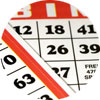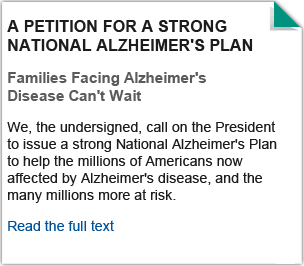Communicating with someone who has Alzheimer’s
How can I communicate better with my loved one who has
Alzheimer's?
Learning about Alzheimer's, how it progresses and how it is managed is critical to understanding how best to interact and communicate with a person who has Alzheimer's disease. In the process you will learn many tips and strategies for coping with the cognitive and behavioral symptoms of the disease. These symptoms will change as the disease progresses, and you may need to continually adapt strategies in accordance with your loved one's level of function and symptomatic behaviors.
One successful approach to reducing inappropriate behaviors is to communicate within the affected person's frame of reference. Consider how your loved one sees the world and interact with respect for that "reality." It can also be helpful to engage the person in reminiscing about happier times by sharing memories and old photos; interactions that are focused on past times that the person might be able to recall may be less stressful than trying to communicate about current or recent events, which may not be accessible to the person.
What are some tips for communicating better?
Here are some other tips that might be useful in interacting with a person with Alzheimer's:
A number of specific communication techniques have been shown to be effective in reducing problematic behaviors and improving day-to-day functioning of people with Alzheimer's and other dementias:
In later stages of Alzheimer's, aggressive or agitated behaviors may become common and may make it increasingly difficult to care for a loved one at home. Though generally viewed as symptoms of the disease itself, some experts believe that such behaviors may in part be reactions to the actions of people around them. For example, talking too loudly or too fast or contradicting the afflicted person's perceived reality might cause agitation. A growing body of research is showing how certain techniques for communicating and interacting with a person who has Alzheimer's can help reduce disruptive behaviors.
If your loved one is agitated or disruptive, examine how your own actions may be influencing that person's behavior. Try to determine if something you have done (or have not done) might be triggering an agitated response and change that behavior in subsequent situations. Certain social situations, such as a holiday reunion of family with noise, kids, pets, etc., may trigger agitation. In such instances, it may be helpful to remove the person to a quiet area away from large groups of people until they calm down.
Learning about Alzheimer's, how it progresses and how it is managed is critical to understanding how best to interact and communicate with a person who has Alzheimer's disease. In the process you will learn many tips and strategies for coping with the cognitive and behavioral symptoms of the disease. These symptoms will change as the disease progresses, and you may need to continually adapt strategies in accordance with your loved one's level of function and symptomatic behaviors.
One successful approach to reducing inappropriate behaviors is to communicate within the affected person's frame of reference. Consider how your loved one sees the world and interact with respect for that "reality." It can also be helpful to engage the person in reminiscing about happier times by sharing memories and old photos; interactions that are focused on past times that the person might be able to recall may be less stressful than trying to communicate about current or recent events, which may not be accessible to the person.
What are some tips for communicating better?
Here are some other tips that might be useful in interacting with a person with Alzheimer's:
- Try to anticipate and address needs or concerns proactively.
- Listen and communicate patiently; try to reduce the frustrations the person may feel from not being able to communicate effectively.
- Use memory cues - verbal, visual, auditory - to help the person stay on track during conversations or day-to-day tasks. For example, place clothes prominently in plain sight, in the order in which they should be put on, or visually guide the person during dressing.
- Write notes to the person to remind him/her to do routine tasks, and provide clear, written directions for accomplishing tasks.
A number of specific communication techniques have been shown to be effective in reducing problematic behaviors and improving day-to-day functioning of people with Alzheimer's and other dementias:
- Reality therapy: Interact with the afflicted person within his or her own frame of reference for the world, even if it has little to do with reality.
- Validation therapy: Don't correct or contradict the person's view of reality; rather, encourage and validate it by really listening and asking questions.
- Redirection: Be creative in redirecting conversation without contradicting or denying the person's statements. Use any opportunity possible to try to elicit fond memories or remind the person of tasks or appointments.
- Memory cueing: Use words and visuals to cue old or recent memories. For example, play videotapes of family events; place reminder notes in plain view; color code or number things in the order they should be done.
In later stages of Alzheimer's, aggressive or agitated behaviors may become common and may make it increasingly difficult to care for a loved one at home. Though generally viewed as symptoms of the disease itself, some experts believe that such behaviors may in part be reactions to the actions of people around them. For example, talking too loudly or too fast or contradicting the afflicted person's perceived reality might cause agitation. A growing body of research is showing how certain techniques for communicating and interacting with a person who has Alzheimer's can help reduce disruptive behaviors.
If your loved one is agitated or disruptive, examine how your own actions may be influencing that person's behavior. Try to determine if something you have done (or have not done) might be triggering an agitated response and change that behavior in subsequent situations. Certain social situations, such as a holiday reunion of family with noise, kids, pets, etc., may trigger agitation. In such instances, it may be helpful to remove the person to a quiet area away from large groups of people until they calm down.
 One of the most common signs of Alzheimer's is memory loss, especially forgetting recently learned information. Others include forgetting important dates or events; asking for the same information over and over; relying on memory aides (e.g., reminder notes or
One of the most common signs of Alzheimer's is memory loss, especially forgetting recently learned information. Others include forgetting important dates or events; asking for the same information over and over; relying on memory aides (e.g., reminder notes or  Some people may experience changes in their ability to develop and follow a plan or
Some people may experience changes in their ability to develop and follow a plan or 
 People with Alzheimer's can lose track of dates, seasons and the passage of time. They may have trouble understanding something if it is not happening immediately. Sometimes they may forget where they are or how they got there.
People with Alzheimer's can lose track of dates, seasons and the passage of time. They may have trouble understanding something if it is not happening immediately. Sometimes they may forget where they are or how they got there. 


 People with Alzheimer's may experience changes in judgment or decision-making. For example, they may use poor judgment when dealing with
People with Alzheimer's may experience changes in judgment or decision-making. For example, they may use poor judgment when dealing with  A person with Alzheimer's may start to remove themselves from hobbies, social activities, work projects or sports. They may have trouble keeping up with a favorite sports team or remembering how to complete a favorite hobby. They may also avoid being social because of the changes they have experienced.
A person with Alzheimer's may start to remove themselves from hobbies, social activities, work projects or sports. They may have trouble keeping up with a favorite sports team or remembering how to complete a favorite hobby. They may also avoid being social because of the changes they have experienced.  The mood and personalities of people with Alzheimer's can change. They can become confused, suspicious, depressed, fearful or anxious. They may be easily upset at home, at work, with friends or in places where they are out of their comfort zone.
The mood and personalities of people with Alzheimer's can change. They can become confused, suspicious, depressed, fearful or anxious. They may be easily upset at home, at work, with friends or in places where they are out of their comfort zone. 

